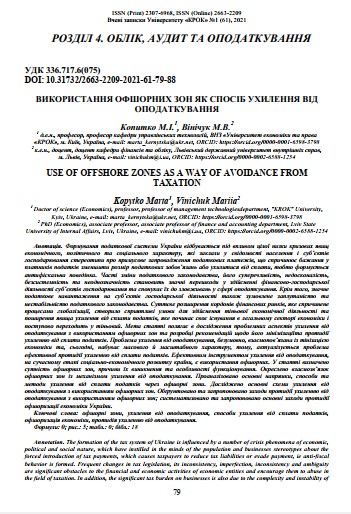USE OF OFFSHORE ZONES AS A WAY OF AVOIDANCE FROM TAXATION
DOI:
https://doi.org/10.31732/2663-2209-2021-61-79-88Keywords:
offshore zones, tax evasion, ways of tax evasion, offshorization of the economy, ounteraction to tax evasionAbstract
The formation of the tax system of Ukraine is influenced by a number of crisis phenomena of economic, political and social nature, which have instilled in the minds of the population and businesses stereotypes about the forced introduction of tax payments, which causes taxpayers to reduce tax liabilities or evade payment, ie anti-fiscal behavior is formed. Frequent changes in tax legislation, its inconsistency, imperfection, inconsistency and ambiguity are significant obstacles to the financial and economic activities of economic entities and encourage them to abuse in the field of taxation. In addition, the significant tax burden on businesses is also due to the complexity and instability of tax legislation. The significant expansion of the borders of financial markets, caused by globalization, has created favorable conditions for the implementation of shadow economic activity and the spread of tax evasion, which begins its existence in the legal sector of the economy and gradually turns into the shadow. The purpose of the article is to study the problematic aspects of tax evasion using offshore zones and to develop recommendations for its minimization and counteraction to tax evasion. The problem of tax evasion, of course, is interrelated with the shadowing of the economy and, today, is becoming widespread and large-scale, therefore, the problem of effective combating tax evasion is relevant. An effective tool of tax evasion at the current stage of socio-economic development of the country is the use of offshore. The article identifies the essence of offshore zones, the reasons for their occurrence and features of functioning. The relationship between offshore zones and the mechanism of tax evasion is outlined. The main directions, ways and methods of tax evasion through offshore zones are analyzed. The basic schemes of tax evasion with the use of offshore zones are investigated. Measures to counteract tax evasion using offshore zones are substantiated and proposed; systematized and proposed the main measures to combat the offshoring of Ukraine's economy.
Downloads
References
Барановський О.І., Голіков В. І., Пасхавер Б. Й. Відмивання грошей: сутність та шляхи запобігання: монографія. Національна академія наук України, Ін-т економічного прогнозування. Харків : Форт, 2003. 472 с.
Варналій З. С. Офшоризація – інституціональна загроза національної економічної безпеки та державності України. Публічне управління економікою України в умовах загроз державності: збірник матеріалів круглого столу (м. Київ, 5 грудня 2018 р.). Київ: КНЕУ, 2018. С. 7–8.
Власюк О. С. Актуальні проблеми фінансової безпеки України в умовах посткризової трансформації : монографія. Київ: НІСД, 2014. 432 с.
Власюк О. С. Національна безпека України: еволюція проблем внутрішньої політики : Вибр. наук. праці. Київ: НІСД, 2016. 528 с.
Користін О. Протидія відмиванню коштів: Міжнародні стандарти, зарубіжний досвід, адміністративно-правові, кримінологічні, кримінально-правові, криміналістичні засади та система фінансового моніторингу в Україні. Одеса, 2015. URL: https://pidruchniki.com/84030/finansi/protidiya_vidmivannyu_ koshtiv.
Корнієнко М. В. Протидія органів внутрішніх справ легалізації коштів одержаних злочинним шляхом. Київ: Національна академія внутрішніх справ України, 2002. 228 с.
Предборський В. А. Детінізація економіки у контексті трансформаційних процесів. Питання теорії та методології: монографія. Київ: Кондор, 2005. 614 с.
Харазішвілі Ю. М. Системна безпека сталого розвитку: інструментарій оцінки, резерви та стратегічні сценарії реалізації: монографія. НАН України, Ін-т економіки пром-сті. Київ, 2019. 304 с.
Чайковська Ю., Ожигiна В. Oфшорний бiзнeс: його спeцифiка i можливості. Вiсник Асоцiацiї бiлоруських банкiв. 2005. № 31. С. 17-21.
Соловій Я. І., Дутка В. В., Дутка А. В. Легалізація (відмивання) доходів, одержаних злочинним шляхом: монографія. Івано-Франківськ: Надвірнянський друк, 2008. 231 с.
Столяров В. Ф., Островецький В.І. Становлення та розвиток офшорної діяльності резидентів України. Економічний вісник Донбасу. 2016. № 1 (43). С. 68 – 82.
Чорномаз П. О., Субачева І. С. Офшоризація економіки як економічна категорія. Актуальні проблеми світового господарства і міжнародних економічних відносин: матеріали ХІ науково-практичної конференції молодих вчених (м. Харків, 25 березня 2016 р.). Харків: ХНУ ім. В.Н. Каразіна, 2016. С. 365-370.
Eнциклопeдiя oфшорного бiзнeсу: Практичний посiбник. Лондон. Цюрiх. Бостон: Finance Research Group, 2007. 255 с.
Податковий Кодeкс України вiд 02.12.2010 р. № 2755-VI URL: http://zakon4.rada.gov.ua.
Про заходи щодо протидії зменшенню податкової бази і переміщенню прибутків за кордон: Указ Президента України від 28.04.2016 р. №. 180/2016. URL: https://zakon.rada.gov.ua/laws/show/180/2016#Text.
Про валюту та валютні цінності: Закон України від 21.06.2018 р. № 2473-VІІІ. URL: https://zakon.rada.gov.ua/laws/show/2473-19#Text.
Єщенко П. С. Як подолати системні витрати неоліберального реформування економіки. Економіка України. 2018. № 1. С. 26–41.
Драган О., Брехов C., Нагорічна О. Удосконалення податкової системи України в контексті викликів та загроз, спричинених поширенням COVID–19. Аналітична записка. Ірпінь: НДІ фіскальної політики, 2020. 96 с.



